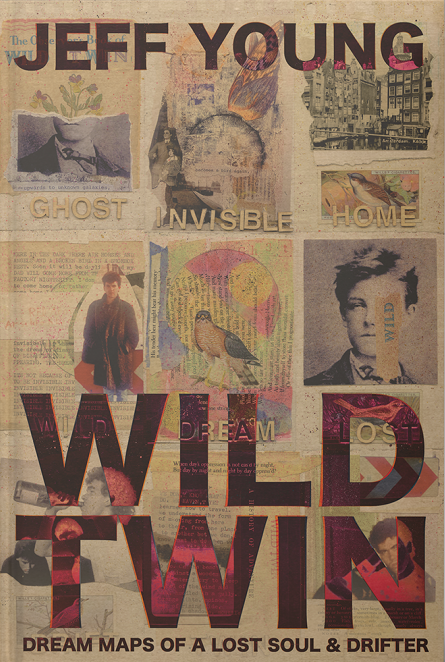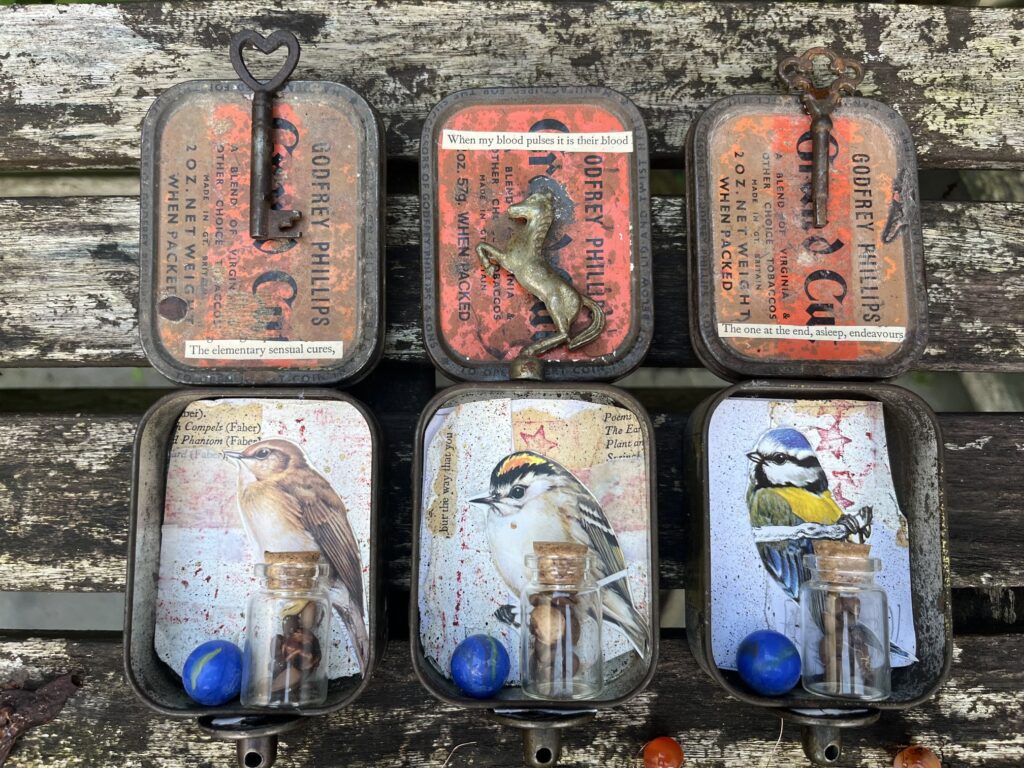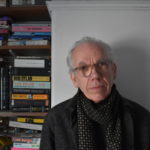Book Review – October 2024
One of the things that struck me about all of this junk was that every single object was a repository of someone else’s memory, because it had got to the auction rooms from the house clearances of dead peoples’ property. The house was a museum of grief and loss and abandonment, and our dad was the curator.

One way of reading Wild Twin, Jeff Young’s companion memoir to 2020’s Ghost Town, is to see it as a tale of three cities: Liverpool, Paris and Amsterdam. But it is also, among many other things, the story of a haunting. The ghost at the heart of Young’s previous book was his mother. Wild Twin, on the other hand, is haunted by the spirit of his late father, Cyril.
As readers of Ghost Town will already know, Jeff Young was brought up in Liverpool. But it is more than just his home city: Liverpool is the lens through which he sees and interprets the world. Young’s first home was in the terraced streets near the Everton FC football ground in Walton. Incidentally, an area with which I have my own maternal family connections. The Young family moved out to suburban Maghull while Jeff was still a child and this remained the parental home until the last year or so and it was where his mother, and more recently his father, died.
Young’s experience of formal education was not a happy or fulfilling one. Nonetheless, he grew up with a love of literature and music, and in particular outsider art. From his mother he learned the joy of walking and exploring; of how quirky and fascinating corners can be found hidden within the city’s streets. Liverpool was Jeff Young’s psychogeographic training ground.
By his late teens Young was in a dead-end clerical assistant job with the local council. Gigs, beer and weed were his escape and filled his weekends. He devoured the writings of Kerouac, Ginsberg and the Beats, he soaked up art house showings of French New Wave films and fed his inner life with the music of Sun Ra, Captain Beefheart, Steve Reich and Can. But he wanted more. He longed to wander the streets of Paris like Sartre, Miller, Burroughs and Beckett before him; to drink absinthe and write poetry. He dreamed of living like a Beat, embracing everything serendipity had to offer and to become a latter-day dharma bum.
So, one March morning fifty years ago Young packed in his job and set out to hitch-hike to Paris. That’s ‘a silly thing to do’ was his father’s understated response as Young announced his plan and said his goodbyes at the family breakfast table. Jeff Young’s friend and fellow aspiring Beat, Stan, accompanied him. But Stan quickly got homesick and turned back to go home at Ostend. Young carried on alone, hitching through Belgium towards Paris; by turns frightened, lonely and exhilarated.
Upon reaching Paris he stays in an attic room in a flea-bitten hotel on the Left Bank, never ceasing to delight in the roofscape view of Paris from the window of his room. He wanders the streets absorbing all the sights, smells and sounds of Paris. He visits Jim Morrison’s grave and some of the locations that were familiar to hime from French films. Opposite his hotel he stands outside the house where William Burroughs and Brion Gysin lodged, but is too fearful to knock on the door. In a bar he is latched onto by a somewhat menacing British exile called Baxter, and he keeps bumping into him in subsequent days.
None of this is the real Paris; all of this is the real Paris. The Paris I wanted to run away to and now I walk through it in tears.
Part One of Wild Twin closes with Young returning home to Liverpool from Paris. He signs on the dole and spends his days and sleepless nights lying in bed reading and listening to music. A dodgy cassette tape of Television’s Marquee Moon, recorded from John Peel’s radio show, seems to speak to him in the darkness of his room. Books and records assault his senses: Young describes them as being like ‘detonations’ and ‘fire alarms’. He senses that his family and friends are talking about him and are concerned for his well-being. He realises that it is time to move on.
and then, in some kind of cancellation of myself, I went suddenly, abruptly, to Germany to have some kind of breakdown.
Young takes a job as a barman on a British army base near Paderborn. He spends his spare time listening to Krautrock and drinking himself into a stupor with Apfelkorn. He returns home the following Christmas having come to realise that he wasn’t going to find whatever it was he was looking for in Germany.
At a party he meets an unconventional young woman called Becks who looks like ‘a punk Elizabeth Taylor’, is an expert shoplifter and loves drinking. He has discovered a soul mate.
she was drunk on her favourite concoction of Merrydown Cider and Cinzano, a dash of Night Nurse on the top just to jazz things up a bit.
They quickly hatch a plan to thumb it around Europe together and, by a circuitous route, end up in Amsterdam. They live amongst squatters, anarchists, illegals and exiles. They work in bars on the black, collect beer bottles for small change, steal bicycles and have their bicycles stolen and raid skips for furniture. Amsterdam occupies most of Part Two of the book. It is a time peopled by a host of unforgettable characters. Bill the Wolf presides over the house they live in and is insomniac, flamboyant and gin-soaked. Harry the young heroin addict, whom Bill loves, lives in a former electrical shop on the ground floor. Mondo the dealer, brooding and malevolent, lives in the attic behind a padlocked trap-door. On the first-floor lives Nina, a Portuguese artist who paints everything pink including her clothes. Young also meets Gregory Corso, the Beat poet, now a shambling husk of his former self.
It is, for the most part, a happy time, especially if one sticks to Bill’s maxim of ‘not to believe’. Young’s parents visit him. They love Amsterdam and he delights in seeing the pair of them wobbling off on bicycles along the canal side, whooping with laughter.
Time Machines, the third and final part of Wild Twin is set back in Liverpool several decades after his time in Amsterdam. Young’s father, Cyril, now a widower, is in hospital with dementia and prostate cancer. His end is inevitable, but he is deemed to be a bed-blocker and must be moved elsewhere. He is taken to a care home at short notice. It is a cold, unhappy and understaffed place and Young and his sister, Kathryn, decide it is time to take their father home. The family home is the semi-detached house in Maghull, a place full of memories and mementoes.
In the year my dad was dying I started building time machines. In tobacco tins and cigar tins I curated memories…

Jeff and Kathryn take turns to be with him. The house is full of memories. These memories may be out of reach for Young’s father, drifting in the fog of Alzheimer’s, but they are all around and they are real. They provide comfort. This final section of Wild Twin is ineffably, painfully sad, especially for those of us who have experienced loss which, sooner or later, is the fate of everyone. But the beauty of Jeff Young’s writing speaks for all of us.
Now in his sixties Young has arrived at another place. But his searching goes on.
The place I wanted to be when I left home was a place where I had no past, no ancestors, no memory. Dislocation from the familiar. Absence. Erasure. The opposite of the way I think and feel now that I’m in my sixties – the past, my ancestors, memory are the centre of my being.
Jeff Young
 Jeff Young is a writer for screen, stage and radio. A former senior lecturer in Creative Writing at Liverpool John Moores University, Jeff lives in Liverpool. He is also the author of Ghost Town.
Jeff Young is a writer for screen, stage and radio. A former senior lecturer in Creative Writing at Liverpool John Moores University, Jeff lives in Liverpool. He is also the author of Ghost Town.

Wow, that sounds amazing, but the end part would be too over-familiar right now, so one for another time, I think.
Sorry for the spoiler Liz, but I think the book flags up where we’re heading quite early on and nothing detracts from the power of the writing in the final section. I think you’d like Ghost Town too.
Oh, no, I’m sorry, I meant we’re going through that stuff in our family at the moment so I can’t face it cropping up in books – I’m glad of the “spoiler”!
So sorry to hear that, Liz.